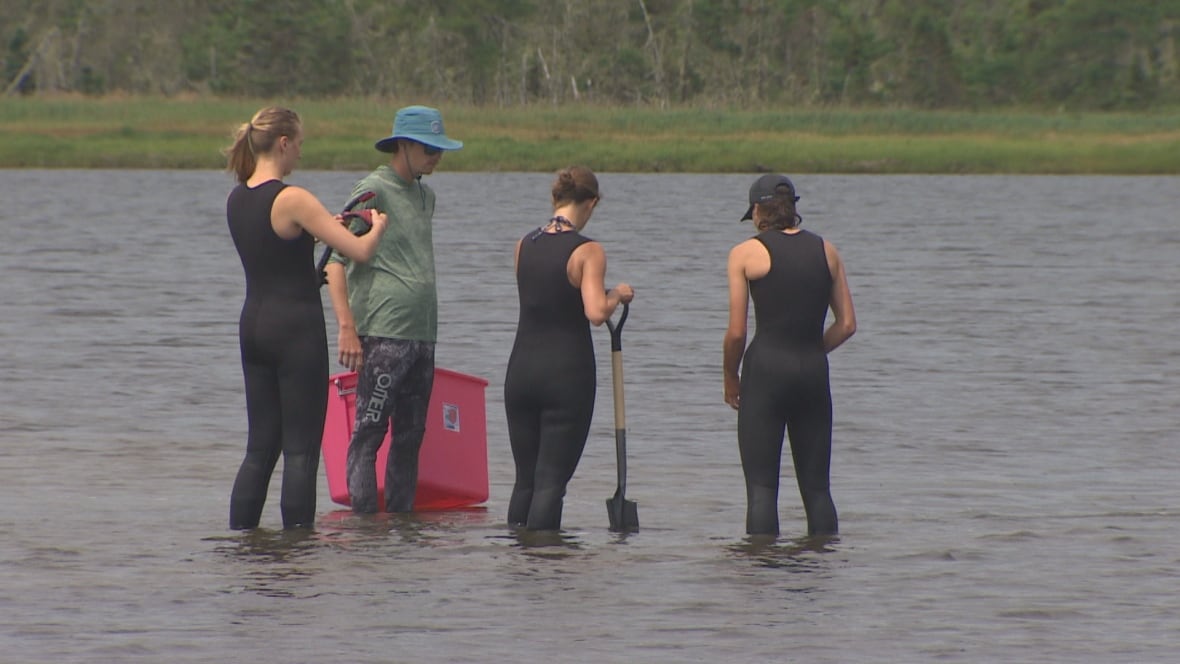Top Stories
Nova Scotia Coastal Restoration Efforts Stalled by Red Tape

URGENT UPDATE: Coastal restoration projects in Nova Scotia face crippling delays due to excessive provincial regulations, prompting concerns over environmental degradation. The Community Eelgrass Restoration Initiative, which has been working on critical eelgrass replanting since 2023, reports that stringent permitting requirements are forcing them to cancel or modify essential projects.
Lead scientist Kristina Boerder stated that the bureaucratic hurdles from the Department of Natural Resources are “astonishing,” especially when corporate projects seem to bypass similar scrutiny. “The amount of red tape has been astonishing, particularly when larger corporate projects are waved through,” Boerder emphasized, highlighting the urgent need for a change in the provincial approach to environmental restoration.
The initiative collaborates with Dalhousie University and the Confederacy of Mainland Mi’kmaq to restore eelgrass, vital for marine ecosystems. Eelgrass provides habitat for critical species like lobster and herring, and its loss has severely impacted Nova Scotia’s coastlines. “Eelgrass is one of these unsung heroes that gives us a lot of benefits,” said Boerder, stressing the ecological importance of their work.
However, the project has faced significant obstacles. Permitting requirements are now akin to those for aquaculture and construction, delaying progress and complicating community-led restoration efforts. “This is a community-led project that benefits everyone. We thought it would be easy to get permits since we’re restoring rather than taking,” Boerder explained. Instead, they have encountered bureaucratic roadblocks, including new demands to notify coastal property owners, which can be nearly impossible due to the anonymity of many landholders.
The frustration extends beyond just eelgrass restoration. Angela Riley, founder of the shoreline cleanup group Scotian Shores, reports that her team spends more time navigating permits than actually cleaning beaches. “It’s so frustrating to be met with so much red tape when we’re trying to protect our environment,” Riley stated, revealing that species-at-risk regulations have even halted essential cleanups.
The Department of Natural Resources maintains that they support eelgrass restoration but emphasize the need for precautions when activities involve Crown land. They require proof of contact with property owners before permits are granted, complicating efforts even further. “When the activity takes place in front of privately owned property, we want property owners to be aware,” their statement read.
These regulatory challenges have real-world consequences. Projects aimed at restoring coastal wetlands are essential for mitigating climate change impacts, yet the current permitting process is hindering progress. Stakeholders are calling for a streamlined, adaptive approach to permitting that reflects the urgency of climate action and the importance of community-led initiatives.
The situation has raised alarms among advocates. Tyler Sack from the Confederacy of Mainland Mi’kmaq shared that last summer, plans for eelgrass replanting were thwarted even on reserve lands due to similar permitting issues. “It’s a pretty low-risk initiative that communities want to see move forward, but we’re hitting obstacles,” he lamented.
As the provincial government publicly commits to streamlining permits for industries like mining, the double standards in environmental restoration are becoming increasingly evident. “It feels like a double standard of who gets to do what and why,” Boerder stated, calling for immediate action that aligns with the community’s commitment to restoring the coastline for future generations.
Advocates warn that without significant changes, Nova Scotia’s coastlines risk “death by a thousand cuts.” The need for a fit-for-purpose regulatory structure is urgent, as stakeholders are eager to tackle the challenges of restoring vital ecosystems.
As this situation develops, communities across Nova Scotia remain hopeful that their efforts will be recognized and supported, allowing them to restore their precious coastlines and protect their ecosystems from further degradation.
-

 Politics4 weeks ago
Politics4 weeks agoSecwepemc First Nation Seeks Aboriginal Title Over Kamloops Area
-

 World5 months ago
World5 months agoScientists Unearth Ancient Antarctic Ice to Unlock Climate Secrets
-

 Entertainment5 months ago
Entertainment5 months agoTrump and McCormick to Announce $70 Billion Energy Investments
-

 Science5 months ago
Science5 months agoFour Astronauts Return to Earth After International Space Station Mission
-

 Lifestyle5 months ago
Lifestyle5 months agoTransLink Launches Food Truck Program to Boost Revenue in Vancouver
-

 Technology3 months ago
Technology3 months agoApple Notes Enhances Functionality with Markdown Support in macOS 26
-

 Lifestyle3 months ago
Lifestyle3 months agoManitoba’s Burger Champion Shines Again Amid Dining Innovations
-

 Top Stories2 months ago
Top Stories2 months agoUrgent Update: Fatal Crash on Highway 99 Claims Life of Pitt Meadows Man
-

 Politics4 months ago
Politics4 months agoUkrainian Tennis Star Elina Svitolina Faces Death Threats Online
-

 Sports5 months ago
Sports5 months agoSearch Underway for Missing Hunter Amid Hokkaido Bear Emergency
-

 Politics5 months ago
Politics5 months agoCarney Engages First Nations Leaders at Development Law Summit
-

 Technology5 months ago
Technology5 months agoFrosthaven Launches Early Access on July 31, 2025





















